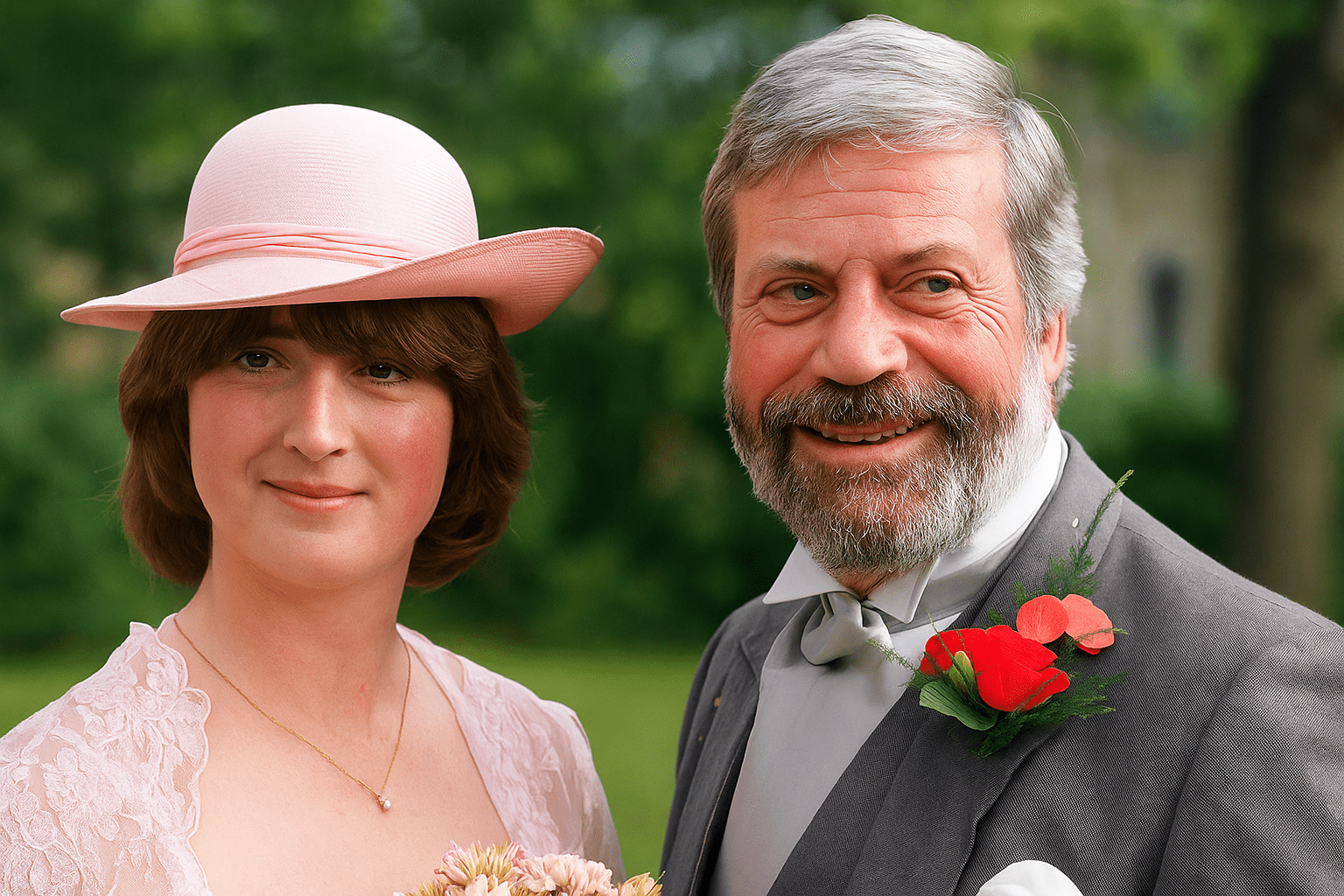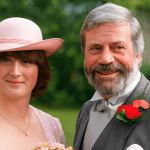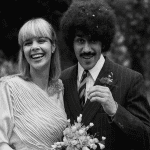In the world of British cinema, few names carry as much weight—or evoke as much fascination—as Oliver Reed. A legendary actor known for his charisma, volatility, and complex personality, Reed’s life was a blend of artistic brilliance and public controversy. But behind that public image stood someone who quietly shaped his later years: Josephine Burge, his second wife and lifelong partner until his death in 1999.
Although not a celebrity in her own right, Josephine Burge’s role in Oliver Reed’s story is profound. She was his anchor, confidante, and stabilizing presence during the final chapters of his life. Her biography reveals a woman of quiet dignity and strength—one who chose a life away from the spotlight, even as it burned brightly on the man she loved.
This article presents an in-depth, fact-based account of Josephine Burge’s life, her marriage to Oliver Reed, their years together in Ireland, and the enduring legacy of their partnership. It is written with respect for her privacy and with attention to the verifiable events that defined her public story.
Early Life and Background
There is remarkably little public information about Josephine Burge’s early life. She was not a public figure before meeting Oliver Reed, and she has never sought attention in her own name. Unlike the families of actors and musicians who often find themselves drawn into the spotlight, Josephine kept her personal history out of public records.
What is known is that she was born and raised in England, and by her late teens, she had met Reed, who was already a major British film star. When they first became acquainted, Reed was in his mid-forties, an established actor best known for roles in Oliver! (1968), Women in Love (1969), and The Devils (1971).
At that point in his life, Reed’s reputation for heavy drinking and on-set mischief was already legendary. Yet, those who knew him personally described a man of intelligence and surprising tenderness beneath the bravado. It was in that period that Josephine Burge entered his life, forming a connection that would grow into a relationship lasting more than two decades.
Meeting Oliver Reed
Josephine and Oliver met in the early 1980s. She was in her mid-teens at the time, and he was in his forties—a difference in age that inevitably drew public attention. Yet, despite this, the two developed a deep emotional bond.
By all credible accounts, Reed treated her with great affection and respect. Their relationship evolved gradually, and after several years of companionship, they decided to formalize their union.
When they married in 1985, Josephine was 21 years old, and Reed was 47. The wedding was not a glamorous celebrity event but a simple civil ceremony held in Epsom, Surrey, attended only by a few close friends. The couple deliberately avoided media fanfare, preferring to keep their marriage private.
The simplicity of their wedding said much about their values. Josephine was not interested in becoming a public personality. She was not a model, actress, or socialite; she was a private woman who happened to fall in love with one of the most flamboyant figures in British entertainment.
Marriage and Life Together
Their marriage marked the beginning of a quieter phase in Reed’s tumultuous life. For years, he had lived the archetypal life of a hard-drinking, hard-living movie star. He was the subject of endless tabloid stories and public fascination. But after marrying Josephine, there was a visible shift in his demeanor.
Friends and biographers have often remarked that Josephine Burge brought calm and domestic stability to Oliver Reed’s world. She wasn’t just a wife; she was his companion, protector, and emotional refuge. She reportedly did not participate in the wild parties or press antics that had defined his earlier relationships. Instead, she nurtured a sense of home and normalcy.
The two shared a deep affection that was evident to those around them. Reed often referred to her with great tenderness, calling her his “beautiful Jo.” Though he remained a larger-than-life character, their relationship grounded him in a way few things had before.
They had no children together, though Reed had two children from previous relationships. Josephine embraced this blended family with quiet grace, maintaining good relations with Reed’s children while respecting their space.
Life in Ireland: Castle McCarthy, Churchtown
In the early 1990s, Josephine and Oliver decided to leave England and settle in Ireland, seeking a slower pace of life away from London’s distractions. They purchased Castle McCarthy, a 19th-century estate near Churchtown, County Cork, which became their permanent home.
The decision to move was as much emotional as it was practical. Reed had always loved Ireland—its people, its pubs, and its sense of community. In Churchtown, he found a place that welcomed him without judgment. Locals came to know both Oliver and Josephine not as celebrities but as neighbors.
Josephine managed the household and supported Reed’s daily routines. Their life in Ireland was a blend of rustic simplicity and occasional indulgence. Reed continued to act in films but took fewer roles, choosing projects that allowed him to stay close to home.
In Churchtown, Josephine and Oliver lived quietly. She became part of the local community, respected for her kindness and discretion. While Reed would sometimes appear at local bars and talk to villagers over pints, Josephine preferred the background—graceful, composed, and protective of their privacy.
Oliver Reed’s Later Career and Josephine’s Influence
During their years in Ireland, Reed’s career experienced something of a renaissance. He starred in a mix of European and independent films, and though he never fully escaped his image as a “hellraiser,” he began to choose roles that reflected a more mature performer.
Friends and colleagues credited Josephine’s stabilizing influence with helping him refocus on his craft. She reportedly encouraged him to accept projects that challenged him artistically and to distance himself from destructive habits.
While she rarely appeared in public, her presence was felt in Reed’s renewed sense of discipline. It was clear that she played a crucial role behind the scenes, managing the quiet rhythms of domestic life that allowed him to work effectively.
Tragedy in Malta: Reed’s Death in 1999
The couple’s peaceful life together was shattered in May 1999, when Oliver Reed died suddenly of a heart attack in Valletta, Malta, while filming Ridley Scott’s Gladiator. He was 61 years old.
Reports at the time noted that Reed had been spending an evening out with members of the Gladiator cast and crew, enjoying drinks at a local bar. The heart attack came unexpectedly, and efforts to revive him were unsuccessful.
Josephine was at home in Ireland when she received the news. Friends later described her as devastated but composed, facing the tragedy with remarkable dignity. Reed’s death shocked the film industry, but for Josephine, it was an unimaginable personal loss.
After the body was returned to Ireland, a funeral was held near their home in Churchtown, attended by family, local friends, and several figures from the film world. Josephine arranged for him to be buried in the local cemetery—a decision reflecting the couple’s deep connection to the community that had embraced them.
The people of Churchtown remembered Josephine for her quiet strength during that period. While others spoke publicly about Reed’s legacy, she chose silence, allowing the work and the memories to speak for themselves.
Life After Oliver Reed’s Death
After Reed’s passing, Josephine Burge withdrew almost completely from public life. She did not seek interviews, publish memoirs, or appear at celebrity events. Her absence from the spotlight underscored her long-standing commitment to privacy.
Over the following years, occasional reports from acquaintances and Reed’s family suggested that she remained in Ireland for some time before eventually relocating. She reportedly remarried in the 2000s, though details about her new life remain scarce—a testament to her ability to maintain privacy even in the digital age.
Friends of the family have occasionally mentioned that she looked after Reed’s estate and personal effects with care, ensuring that his memory was preserved respectfully. There is no record of her selling their Irish home for several years after his death, which suggests that she remained emotionally tied to it long after.
Josephine Burge’s Character and Legacy
Although she has rarely spoken publicly, those who knew Josephine describe her as gentle, intelligent, and fiercely loyal. Her love for Reed was unwavering, but it was grounded in realism rather than glamour.
In interviews given by Reed’s friends and collaborators, Josephine is often remembered as the woman who provided peace and structure to a man whose life had long been dominated by chaos. She was not intimidated by Reed’s reputation or celebrity status; instead, she met him as an equal partner, unafraid to tell him the truth when needed.
Her restraint also set her apart from many public figures’ partners. In an age when celebrity spouses often monetize their stories through interviews or memoirs, Josephine has remained entirely silent about her private life. This discretion has, paradoxically, earned her widespread respect.
Today, her legacy lies in how she helped reshape the narrative of Oliver Reed’s final years. Without her, his story might have ended in self-destruction. With her, it closed with dignity, community, and a sense of peace that eluded him for most of his life.
Public Perception and Media Portrayal
The media’s view of Josephine Burge has always been shaped through the lens of Oliver Reed’s fame. In the 1980s, when their relationship first became public, tabloids focused heavily on their age gap, often sensationalizing it. However, as time passed, journalists began to see her as a steadying force rather than a controversy.
By the 1990s, even the most gossip-oriented outlets acknowledged her importance in Reed’s personal evolution. When he passed away, obituaries from major publications described Josephine as his “devoted wife” and “constant companion.”
Crucially, there was never any public scandal or dispute involving her—something almost unheard of in the turbulent world of celebrity marriages. Her quiet conduct not only preserved her own dignity but also helped maintain Reed’s posthumous reputation.
Cultural and Emotional Significance
Josephine Burge represents a rare archetype in celebrity culture: the unseen pillar of strength. Her story resonates not because of public achievements or fame but because of her humanity—her loyalty, resilience, and choice of privacy over attention.
For fans of Oliver Reed, understanding Josephine’s role offers a deeper appreciation of his final years. She was the person who allowed him to retreat from the chaos of his youth, to live simply, and to die at peace.
In this way, her biography is not just a footnote to Reed’s story; it is a central chapter in the narrative of redemption and emotional stability that defined his later life.
Commemoration and Legacy in Ireland
In Churchtown, the small Irish village they called home, Josephine and Oliver are remembered fondly. Locals often tell stories of the couple’s generosity—Reed buying rounds at the local pub, Josephine quietly supporting community events.
Their estate, Castle McCarthy, remains a landmark in the area. Even years after Reed’s death, fans would visit the village to see the home where he lived with Josephine, and locals would speak warmly of both.
When Reed was buried in Churchtown’s cemetery, Josephine ensured that his grave remained modest—marked by a simple headstone rather than an elaborate monument. Visitors still leave flowers there today, a quiet testament to the love and life they shared.
Personal Values and Influence
Throughout her adult life, Josephine Burge embodied values that seem increasingly rare in the public sphere: privacy, loyalty, humility, and integrity.
She married one of Britain’s most controversial and charismatic actors—and yet, she never used that relationship to advance herself publicly. There were no interviews, tell-all books, or personal brands attached to her name.
In many ways, she represented the antithesis of celebrity culture. She valued personal life over public recognition, authenticity over fame. That choice not only protected her but also helped preserve the dignity of Reed’s memory.
Lessons from Josephine Burge’s Life
From an outside perspective, Josephine’s story offers several timeless lessons:
-
Love can humanize even the most untamed souls.
Her marriage showed that emotional stability and understanding could bring peace to a man long defined by excess. -
Privacy is power.
In a world obsessed with visibility, Josephine’s deliberate withdrawal from publicity is an act of quiet strength. -
Dignity outlasts drama.
Her refusal to engage in media speculation or capitalize on fame has ensured that her legacy remains one of respect. -
Behind every public figure is a private world that shapes them.
Without Josephine, Oliver Reed’s final years—and the redemption arc they represent—would likely have been very different.
Conclusion
Josephine Burge remains one of the most enigmatic figures in British celebrity history—not because of mystery for its own sake, but because of her deliberate choice to remain private. Her influence on Oliver Reed’s life is undeniable: she brought him peace, companionship, and a sense of home that had long eluded him.
Their marriage, though unconventional by tabloid standards, was deeply human. It was a story of loyalty, resilience, and quiet love that endured until death.
More than two decades after Reed’s passing, Josephine’s legacy continues—not through public appearances or self-promotion, but through the way people remember the man she loved. Every mention of Oliver Reed’s tranquil final years in Ireland is, in part, a tribute to her.
She is, ultimately, the invisible architect of that serenity: a woman who lived privately, loved deeply, and left behind a legacy of grace.










